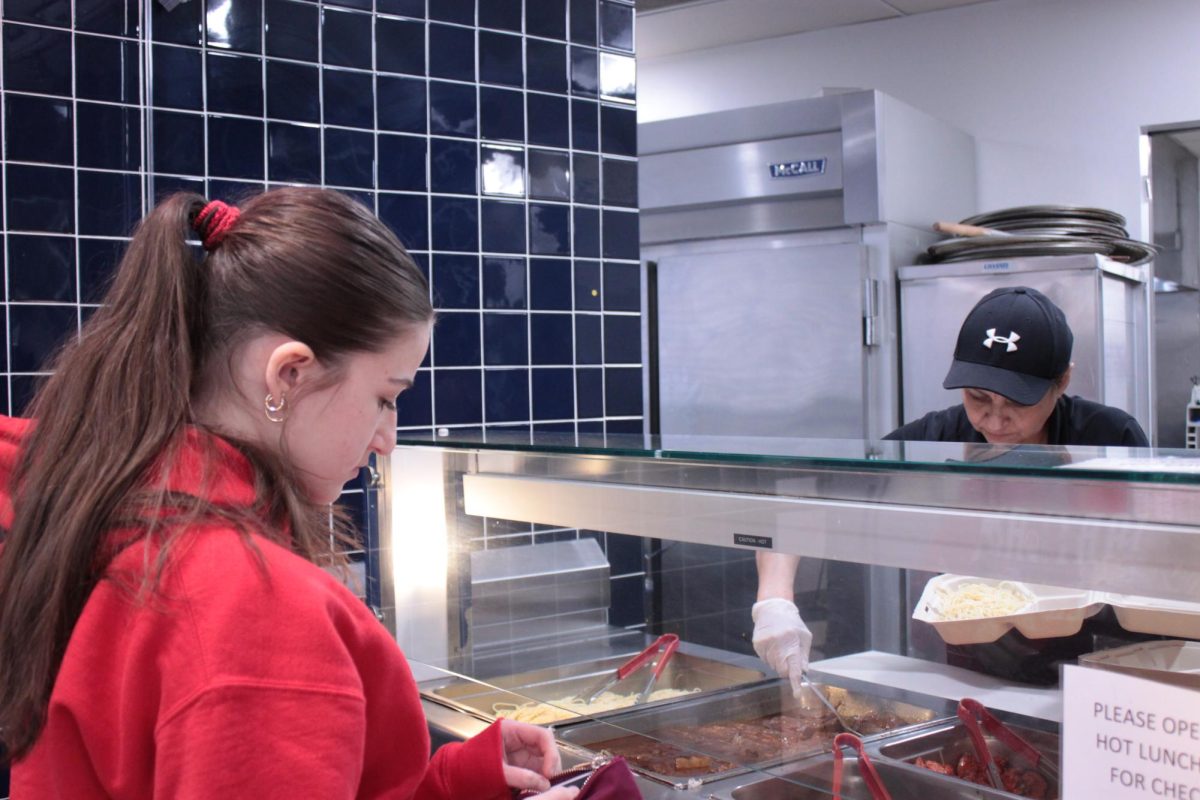Every day at the start of lunch, the Dining Hall comes alive with activity and excitement as hungry students rush in, eager for a fresh meal. While purchasing food is simple for students, much more goes on behind the scenes for the kitchen staff. The food service team, Director of Food Services Mark Glauser and his team of eight members, works to keep up with the daily rush.
CESJDS provides daily lunch services to students at both campuses upon purchase. All food is prepared in the kitchen at the Upper School. Some is later transported to the Lower School, where it is put in warmers and then distributed at lunch. The Upper School has a larger kitchen facility with a more complete set of appliances, including three separate kitchens (for dairy, meat and pareve meals) to abide by kashrut.
In addition to lunch services, the Dining Hall team offers catering through its service “The Mane Course,” which sells food on the JDS website and caters for various events held at the school. Every Friday, the team also makes challahs for JDS families who have pre-purchased them through the Parents Association and for Lower School classes to eat.
One of Glauser’s first steps in the meal preparation process is designing the lunch calendar. According to Glauser, many factors influence what food is served, including the necessity of providing a healthy meal that students enjoy.
“We researched about [meals from] past years, what succeeded [and] what hasn’t succeeded,” Glauser said. “From there, we try to serve three dairy meals a week and two meat meals. Then we have to consider what the holidays are, what days [school is] off, what days we are not serving lunch and then we put it together.”
After the menu is established, the Dining Hall orders and receives shipments of food at varying frequencies depending on the need, ranging from every few days to every few weeks. Glauser said that the staff never really knows how many students they are cooking for. However, it is still crucial that they make the right amount, as they must ensure that everyone who wants food can buy lunch, while also minimizing waste.
It is very tricky to make a dependable estimate. One way Glauser says they manage is by looking at past meal sales to see what people buy.
To stay ahead in food preparation, the food service team gets portions ready in advance while still providing fresh meals for lunch. For example, if the Dining Hall is serving schnitzel, they may bread and sear the chicken ahead of time so that on the day of, they only need to put it in the oven.
Kashrut adds many extra steps in the kitchen. Dining Services Manager Michal Cepler (‘03) serves as the mashgiach for the kitchen. She supervises the kitchen and turns on all heat elements, as Jewish law requires a rule-abiding Jew to activate heating elements for the food to be considered kosher. Kashrut also requires the food service staff to pay more attention to how to make meals appealing to students.
“I grew up kosher, so in my perspective, I already know the general idea of ‘Oh, this will be a good meal.’ But for people who didn’t, they have to shift their mind,” Cepler said. “So, okay, we can’t have a cheeseburger. How do we make this meal exciting without the cheese?”
Kashrut also impacts costs, as hechshered ingredients are significantly more expensive. Glauser said that the cost serves as a major challenge, as no one wants to pay a lot for their lunch, but kosher foods cost more.
Additionally, kashrut affects the availability of products on the market. For example, with the spread of Bird Flu, chickens and eggs go to non-kosher markets first, making it harder and pricier for JDS to get those products.
Glauser said JDS is a red zone school, meaning that the kitchen prepares all its food from scratch using raw ingredients. This means that JDS is in the same category as most restaurants. Consequently, while health inspectors visit Montgomery County Public Schools once a year, they come to JDS four times a year.
Since JDS prepares their own food, they have to be especially aware of allergies. In order to be allergy-friendly, the food service team receives “allergy kits” containing the necessary food to make an allergy-friendly meal. Junior Julian Goldberg, who is allergic to dairy, finds the lunch service to be very accommodating. Goldberg buys lunch from school almost every day, as he finds it easier than making his own lunch. He likes that the system is quick and easy and he enjoys the food.
“[The Dining Hall] offers quality lunches pretty much every day with paying using your [student ID] card, which is convenient programming,” Goldberg said.
Throughout the day, Glauser and Cepler coordinate team communication. Cepler noted that unexpected issues such as delayed deliveries or spoiled items often arise, requiring quick solutions. She said that her favorite part of the day is working at the register, where she enjoys helping students get their meals.
“Sometimes kids tell me about their day, sometimes they’re goofing around, or they make jokes with me, and it just gives me an energy to keep going,” Cepler said. “I’m a Jewish mom, so I love feeding people, but I think just seeing students happy and enjoying their food is just really rewarding.”








